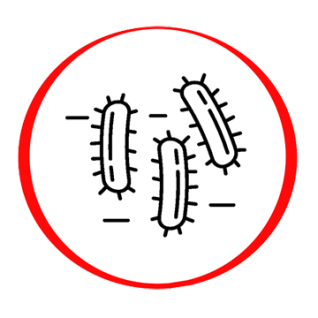Blood take service 5.00€

Pertussis Virus IgA Antibodies
30.00€
The validity period of online orders: 3 months from the purchase date.
Pertussis is caused by the Bordetella pertussis bacterium, which, upon settling in the upper respiratory tract, releases toxins that lead to symptoms characteristic of pertussis. Pertussis is contracted through airborne droplets from an infected person: by talking, sneezing, or especially coughing. The disease is often spread by adults who are unaware that they have pertussis, as their symptoms are milder, and pertussis is often mistaken for other upper respiratory tract infections.
An individual with pertussis can spread the disease for about 20 days, from the onset of the first symptoms to 2 weeks after the characteristic coughing attacks begin. Pertussis is generally contracted during the cold season—late autumn, winter, or early spring. It most commonly affects children aged 1-5 years, but newborns and infants are also very susceptible to this disease.
In Lithuania, according to the preventive childhood vaccination schedule, children are vaccinated against pertussis at 2, 4, 6, and 18 months, and later at 6-7 years old. Immunity lasts only about 10 years after vaccination and about 7 years after having the disease (depending on the immune system). Immunity to pertussis begins to wane about 2 years after vaccination or infection. Due to the relatively short duration of immunity and the belief that adults often spread pertussis, many countries recommend revaccination for adolescents and adults, as well as pregnant women and their family members. In Lithuania, since 2015, revaccination has been offered free of charge to adolescents aged 15-16.
Revaccination is especially recommended for parents who have or plan to have young children, as well as other family members—teenagers and grandparents. Since a significant portion of infants and young children (statistically, 80% of infants contract pertussis from adult family members) experience complications: dehydration; apnea (temporary cessation of breathing) - occurs in 61%); pneumonia - 23%; convulsions (severe uncontrolled seizures) - 1.1%; death - 1%.
S y m p t o m s :
- For 1-2 weeks, pertussis symptoms resemble many cold illnesses—the patient has a runny nose, sneezes, has a slight fever, and coughs a little. During this stage, pertussis is often mistaken for a common cold.
- As the disease progresses, it enters the stage of characteristic coughing attacks, which lasts 1-6 weeks but can extend up to 10 weeks. There can be several to dozens of attacks per day, intensifying and becoming stronger at night. During an attack, the cough is dry, spasmodic, very intense, and the patient may start to choke, vomit, become very tired, and frightened. However, since adolescents and adults have stronger immune systems, they usually endure this disease more easily, and the cough may be quite typical, without severe and very exhausting coughing attacks.
- Recovery from pertussis is lengthy, taking 2-6 weeks, sometimes several months. However, it can recur at any time, especially if the person catches a cold or contracts a respiratory infection.
D i a g n o s i s :
Tests conducted to diagnose pertussis:
- CBC (increased lymphocyte count)
- Bacteriological culture test from the nasopharynx
- Bordetella pertussis IgA antibodies – appear only during the disease, 3-6 weeks after symptoms begin
- Bordetella pertussis IgG antibodies – appear 4 weeks after symptoms begin and indicate current pertussis infection or past vaccination. It is recommended to perform this test together with the IgA antibody test.
Diagnosing pertussis:
- In children – pertussis can be suspected if frequent and extremely exhausting, intense coughing attacks occur, intensifying at night.
- In adults – symptoms are less obvious, but if there is a cough lasting 2 weeks or more, tests should be conducted.

Reference: 17096
30.00€






